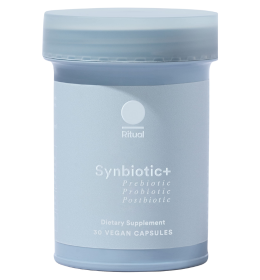Your gastrointestinal system is home to trillions of bacteria and other microorganisms that influence your overall health. An imbalance in these gut microbes, an unhealthy lifestyle, and high-stress levels can negatively impact how well your gut functions.
Common symptoms of poor gut health include bloating, constipation, diarrhea, and inflammation.
Fortunately, there are ways to restore the balance of gut bacteria in your microbiome and to help heal your gut naturally. In this article, you’ll learn how to create a healthy gut microbiome with healthy lifestyle habits.
8 Healthy Ways To Improve Your Gut Health
- Eating high-fiber and prebiotic foods.
- Consuming probiotics.
- Increasing consumption of anti-inflammatory foods.
- Drinking water and bone broth.
- Avoiding allergens and highly processed foods.
- Managing stress.
- Getting enough sleep.
- Exercising.
8 Best Ways To Improve Gut Health
Want to know how to improve gut health naturally and experience better digestion? First, focus on your diet, then improve your exercise routine, sleep schedule, and stress management.
Read on to learn evidence-based strategies for improving your digestive system.
Featured Partner Offer

Ritual Synbiotic+
- 3-in-1 formula: prebiotics, probiotics, and probiotics
- Supports a balanced gut microbiome
- Supports bloating, gas, and diarrhea
- Supports the growth of beneficial gut bacteria
- Vegan and Third-party tested
Consume More Fiber And Prebiotic Foods
Prebiotics are non-digestible fibers that feed beneficial gut bacteria. Consuming high-fiber foods and prebiotic-containing foods provides “food” for probiotics to thrive, creating a favorable gut microbiome.
Focus on eating a variety of fiber-rich fruits, vegetables, nuts, seeds, and whole grains. Aim for 25-38+ grams of total fiber intake daily. Fibrous and prebiotic foods include:
- Bananas: Bananas contain inulin, a prebiotic that enhances good bacteria like Lactobacillus species.
- Asparagus: Asparagus is a source of inulin that spurs probiotic growth.
- Garlic: Garlic contains inulin fructooligosaccharides or FOS prebiotics.
- Onions: Onions also contain inulin and FOS that feed probiotics.
- Apples: Apples are high in pectin fiber and polyphenols that support a healthy gut.
- Legumes: Beans, lentils, and peas contain beneficial starches called oligosaccharides that support microbiome diversity.
Up Your Intake Of Probiotics (From Foods And Supplements)
Probiotics are beneficial types of microbes, including bacteria and yeast, that support many functions within the gastrointestinal tract and help restore gut health. They’re needed to support nutrient absorption and immune defenses.
Want to know how to increase good bacteria in your gut naturally? Probiotics are available both from fermented foods and supplements containing concentrated amounts of certain probiotic strains.
Here’s how to increase beneficial gut bacteria in your digestive tract by eating the top probiotic and fermented foods:
- Yogurt: Choose unsweetened yogurts with live active cultures.
- Kefir: Kefir is a tart “drinkable yogurt,” a potent source of Lactobacilli and Bifidobacteria probiotic strains.
- Sauerkraut and pickles: Cultured veggies, including sauerkraut and pickles, contain diverse beneficial bacteria that form during fermentation.
- Kimchi: This spicy fermented cabbage delivers a variety of probiotics.
- Miso: Made from fermented soybeans, miso has been a traditional food in Asian cultures for many centuries.
- Kombucha: Kombucha is a fizzy probiotic drink that is a gut-friendly substitute for soda. Just choose one with less sugar content.
For targeted gut microbiome support, taking a daily probiotic supplement can help increase beneficial bacteria populations.Look for probiotic supplements that contain evidence-based strains such as:
- Lactobacillus species: These stains may help reduce diarrhea and improve irritable bowel syndrome symptoms.
- Bifidobacterium species: These can help improve gut barrier function and overall digestion.
- Bacillus coagulans: This lactic acid-producing bacteria may help relieve abdominal pain and bloating.
Eat More Anti-Inflammatory Foods
Chronic inflammation is both a cause and effect of poor gut health. Following an anti-inflammatory diet can help.
In particular, a diet rich in omega-3s, antioxidants, and vitamins for gut health can help to support a healthy gut microbiome.
Many of these are also foods that help with bloating and constipation and support your immune system and mental health. Anti-inflammatory foods include:
- Fatty fish like salmon, mackerel, sardines, and tuna.
- Nuts and seeds such as walnuts, almonds, flaxseeds, and chia seeds.
- Colorful fruits and vegetables, including leafy greens, berries, mushrooms, citrus fruits, peppers, and broccoli.
- Green tea and herbal teas.
- Healthy fats, including extra virgin olive oil, flaxseed oil, avocado, and avocado oil.
- Herbs and spices, including turmeric, chamomile, aloe vera, peppermint, cinnamon, and ginger. These can be added to meals or consumed as herbal teas.
Drink Lots Of Water And Try Bone Broth
Dehydration interferes with normal gastrointestinal function; therefore, drinking adequate water is vital for optimal gut health. Drinking water helps soften stool, prevents constipation, supports kidney function, and enhances the mucus layer lining the gut.
Aim to drink about eight glasses of water daily, sipping throughout the day rather than chugging a lot at the end of the day. For additional flavor, add lemon, mint, or cucumber.
Bone broth is another hydrating drink that contains collagen, amino acids, and nutrients that may help heal intestinal permeability and nourish the gut lining. You can easily make your bone broth from scratch using stock, animal parts like leftover bones, and herbs Alternatively, you can opt for organic vegetable or chicken bone broth found at butcher shops and farmer’s markets.
Avoid Gut-Irritating Foods And Common Allergens
If you suspect certain foods irritate your gut, try eliminating them for a while to see if your symptoms improve. Then, you can slowly re-introduce one food at a time to determine the biggest offenders.
Work with a nutritional professional trained in elimination diets to follow a standard process for eliminating and re-introducing foods.
Common culprits for gut-related issues include gluten, dairy, eggs, corn, soy, and nuts. It’s
Additionally, eating lots of sugar and processed foods can feed harmful bacteria in the gut and interfere with digestion in other ways. Reduce your intake of processed and packaged foods in favor of whole foods, especially those containing these irritating ingredients:
- Added sugars: Found in sodas, juices, candies, baked goods, and sweets.
- Refined carbohydrates: Skip foods made with white flour, including bread, pasta, desserts, and cereals.
- Processed meats: Deli meats, hot dogs, and sausage contain chemical preservatives that can be hard for some people to digest.
- Hydrogenated oils: Trans fats found in fast foods, fried items, and many packaged snacks are associated with various health risks.
Cultivate A Healthy Mindset To Manage Stress
Due to the “gut-brain connection,”which consists of nerves connecting the brain and gastrointestinal tract, chronic stress significantly affects your gut microbiome.
Stress can alter bacterial populations in the gut and decrease helpful species. Plus it can increase gut barrier permeability which can potentially worsen inflammation.
Practices like meditation, yoga, deep breathing, and gratitude journaling activate the “rest and digest” part of the nervous system, helping to counteract stress.
Furthermore, your mindset can impact how your body perceives and handles stress. Approach changes you’re making and challenges with self-compassion. Foster gratitude for everything your body lets you experience while cultivating more presence and mind-body awareness.
Get Quality Sleep
Adequate sleep is linked to a healthier gut microbiome. On the flip side, poor sleep increases harmful bacteria in the gut and can impair intestinal barrier function.
Prioritize getting seven to nine hours of quality sleep per night to support your microbiome. Maintain a consistent bedtime and wake time, limit devices at night, and create a relaxing bedtime routine to optimize sleep.
Exercise Regularly
Regular exercise provides multiple benefits for balancing gut bacteria and improving gastrointestinal function. Physical activity reduces systemic inflammation, decreases stress hormones, stimulates bowel motility to reduce bloating, and enhances blood flow to the gut.
Aim for 30-60 minutes of moderate exercise, like brisk walking, most days of the week. Yoga and pilates are great, too, especially if you’re experiencing lots of stress, have injuries, or you’re struggling to sleep.
When Should You See A Doctor About Your Gut Health
Visiting a doctor is also particularly important if your symptoms disrupt your daily life.
Additionally, seek medical care if you have persistent symptoms that don’t respond to lifestyle changes or over-the-counter medications, such as debloat pills or antacids.
If you suspect food allergies, experience anal leakage, or have a family history of digestive conditions like inflammatory bowel disease or colon cancer, see a doctor for an evaluation.
Conclusion
There are many natural, safe ways to rebalance your gut microbiome and optimize digestion through a healthy lifestyle, balanced nutrition, and stress relief. Give your digestive tract time to heal with consistent gut-friendly habits, including a diet high in fiber, probiotics, and antioxidants.
Keep in mind that your gut and brain are connected. Therefore, nurturing your mental health by addressing stress, getting adequate sleep, and exercising regularly, supports gut health.
Frequently Asked Questions
Bloating, constipation, diarrhea, abdominal pain, slow digestion, acid reflux, and fatigue indicate impaired gut health.
Seven ways to improve gut health include:
Eating more prebiotic fiber, probiotic foods, anti-inflammatory foods, bone broth, and fermented foods.
Reducing your sugar intake, processed foods with refined flour, and fast foods.
Stay hydrated and work on lowering your stress levels.
If you want to know how to heal gut health, the truth is that a strict detox program or cleanse may not be necessary. However, most people can benefit from eliminating processed and inflammatory foods in favor of more whole foods.
Having consistently good digestion, regular bowel movements, and no abdominal pain, extreme gas, or bloating are three signs of a healthy gut. In other words, healthy gut function means you should go to the bathroom regularly, not always need to fart, and not feel stomach pains often.
Start by improving your diet, such as by eating more prebiotic and probiotic foods, eating more anti-inflammatory foods, and drinking more water. Then, focus on stress relief, sleeping well, and getting more physical activity to help heal the gut.
Some of the best foods for improving gut health include: yogurt or kefir, kimchi, fruits like berries and apples, garlic, vegetables like leafy greens and onions, fish, lentils and beans, whole grains, and nuts.

